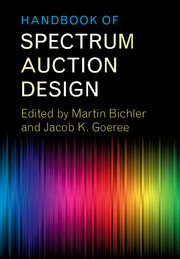Book contents
- Frontmatter
- Contents
- List of Contributors
- Preface
- List of Papers
- Part I The Simultaneous Multiple-Round Auction
- 1 Putting Auction Theory to Work: The Simultaneous Ascending Auction
- 2 An Equilibrium Analysis of the Simultaneous Ascending Auction
- 3 The Efficiency of the FCC Spectrum Auctions
- 4 Measuring the Efficiency of an FCC Spectrum Auction
- Part II The Combinatorial Clock Auction Designs
- Part III Alternative Auction Designs
- Part IV Experimental Comparisons of Auction Designs
- Part V The Bidders’ Perspective
- Part VI Secondary Markets and Exchanges
- Outlook
- References
3 - The Efficiency of the FCC Spectrum Auctions
from Part I - The Simultaneous Multiple-Round Auction
Published online by Cambridge University Press: 26 October 2017
- Frontmatter
- Contents
- List of Contributors
- Preface
- List of Papers
- Part I The Simultaneous Multiple-Round Auction
- 1 Putting Auction Theory to Work: The Simultaneous Ascending Auction
- 2 An Equilibrium Analysis of the Simultaneous Ascending Auction
- 3 The Efficiency of the FCC Spectrum Auctions
- 4 Measuring the Efficiency of an FCC Spectrum Auction
- Part II The Combinatorial Clock Auction Designs
- Part III Alternative Auction Designs
- Part IV Experimental Comparisons of Auction Designs
- Part V The Bidders’ Perspective
- Part VI Secondary Markets and Exchanges
- Outlook
- References
Summary
From July 1994 to July 1996, the Federal Communications Commission (FCC) conducted nine spectrum auctions, raising about $20 billion for the U.S. Treasury. The auctions assigned thousands of licenses to hundreds of firms. These firms are now in the process of creating the next generation of wireless communication services. The questions addressed in this note are: Were the auctions efficient? Did they award the licenses to the firms best able to turn the spectrum into valuable services for consumers?
In addressing these questions, I focus on the narrow question of license assignment. Assignment is the second step in the process of utilizing spectrum. The first step is the allocation of the spectrum for licensing. The allocation defines the license (the frequency band, the geographic area, the time period, and the restrictions on use). I focus on assignment, since that is what the FCC spectrum auctions were asked to do. More general auctions that determine aspects of the allocation, such as band plans, have yet to be implemented.
Why should we care about auction efficiency? If resale is allowed, will not postauction transactions fix any assignment inefficiencies? The answer is “yes” in a Coasean world without transaction costs. However, transaction costs are not zero. Postauction transactions are often made difficult by strategic behavior between parties with private information and market power. The experience with the cellular lotteries is a case in point. It took a decade of negotiations and private auctions for the eventual service providers to acquire desirable packages of licenses from the lottery winners. Efficient auctions are possible before assignments are made but may become impossible after an initial assignment. The problem is that the license holder exercises its substantial market power in the resale of the license. For this reason, it is important to get the assignment right the first time.
Information
- Type
- Chapter
- Information
- Handbook of Spectrum Auction Design , pp. 54 - 61Publisher: Cambridge University PressPrint publication year: 2017
References
Accessibility standard: Unknown
Why this information is here
This section outlines the accessibility features of this content - including support for screen readers, full keyboard navigation and high-contrast display options. This may not be relevant for you.Accessibility Information
- 3
- Cited by
